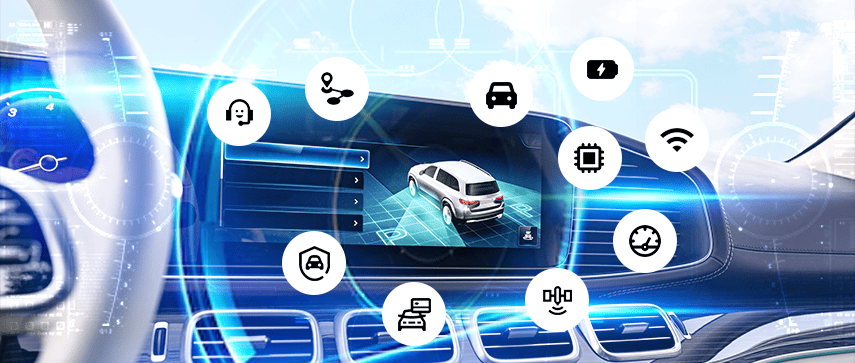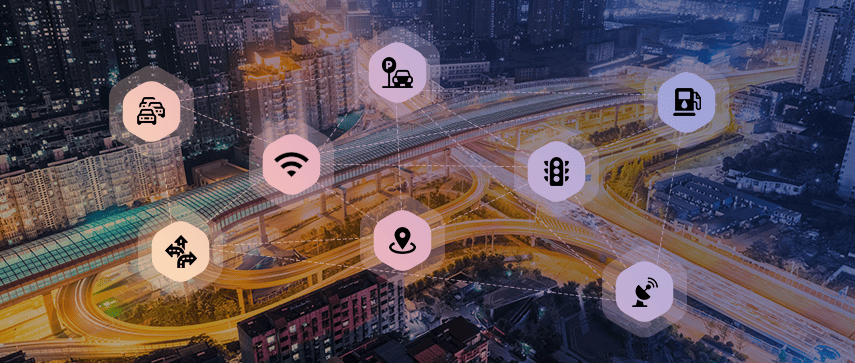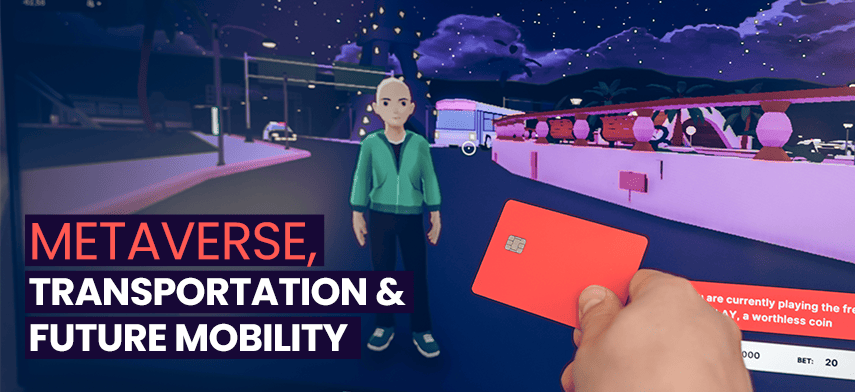Metaverse – a new realm of infinite and promising possibilities, creativity, and innovations is emerging in front of us.
Little did we know this sci-fi concept would pervade the real world and end up gaining traction by the minute from companies including JP Morgan, Microsoft, Google, Hyundai, Nike, Meta, and other investors in the industries. Metaverse is likely to affect every sector in the coming years, with the global market size expected to be $824.53 Billion by 2030.
It stands to impact all facets of transportation and mobility, including urban transportation, employee transportation, event transportation, EV, logistics, supply chain, public transit, aircrew transportation, and intelligent transportation systems.
Transport and urban planners, mobility leaders, city officials, supply chain specialists, and investors must know and explore the emerging Metaverse technologies to facilitate acceptance as well as implementation.
With all that in mind, first, let us understand the concept of Metaverse in detail. After that, we will deep dive into Metaverse and transportation, including the future of transportation industry.
What is the Metaverse Concept?
Metaverse is an immersive virtual space and integrated 3D version of the internet. It is the convergence of interoperable technologies, such as AI/ML, AR/VR, Web 3.0, haptic technology, Cloud computing, Blockchain, and IoT.
It enables humans to create and control their own characters/programmable avatars to live in a virtual world and replicate key aspects of the physical world using smart devices while seamlessly collaborating the virtual world with the physical one.
Metaverse has its own digital native economy, known as Metanomy, which has digital assets, trades, and digital currencies. Much has been written about the concept, including how to access the Metaverse and how it is going to change our lives. The Metaverse is an amazing concept that simplifies life and processes.
Here are some real-world examples of Metaverse -
- AR/VR powered education providing experiential learning like Novartis
- Virtual events with immersive experiences, like Ariana Grande's 2021 concert
- Hyundai Mobility Adventure & virtual Motorstudio
- JP Morgan Onyx Lounge for the exchange of digital assets and data
- Mark Zuckerburg’s Meta enabling people to socialize and work in the Metaverse
Market demands, supply, exceptional benefits, boundless opportunities, and technological advancements are driving more people into Metaverse. It has endless possibilities for almost every sector, including transportation and logistics. It will change the way people or goods move around.
It can be hard to imagine what the Metaverse-powered mobility will look like and how businesses can prepare for it. Our today’s blog will focus on the same and give you key insights into forward-looking transportation systems and mobility solutions.
Let's explore the future of transportation and mobility within the Metaverse continuum.
Deeper Dive into Metaverse Transforming Transportation and Future Mobility
Increasing urbanization, the transformation of mega-cities, massive social trends, and technological advancements are continuously changing mobility patterns. This pace of change in mobility is likely to increase because of Metaverse and disruptive technologies.
By connecting physical elements related to transportation with virtual elements, Metaverse allows transport planners to reshape the way people move. This concept is known as MetaMobility (Meta mobility), in which smart devices or robots interact with humans to provide a range of mobility services.
With emerging technologies and human acceptance of new transportation modes powered by digital tools, the future of mobility will be automated, more efficient, reliable, and sustainable.
Let’s see how Metaverse will transform the transportation industry and what the future of mobility looks like.

Impact of Metaverse on Transportation and Future Mobility
1 Immersive Experiences will be Delivered

In May 2022, Hyundai Motor gave a glimpse of the Metaverse-powered digital experience by enabling the Sonata N Sports car test drive in the virtual space and has invested heavily in future mobility via Metaverse. Acura Honda launched its first virtual showroom within the Decentraland platform in the Metaverse and launched a limited edition Integra NFT. Similarly, other companies have also come up with their own version of Metaverse to differentiate mobility-related offerings and provide immersive experiences to people.
Metaverse is poised to enhance real-life interactions instead of replacing physical world interactions. The two automobile giants plan to do the same for their customers. They aim to enhance customer experience and focus on overcoming physical limitations using advanced technologies and smart devices. That’s what Metaverse will do for the transportation industry across all levels, from the manufacturing of goods or materials to the movement of goods and people.
Physical world traversal will be made easier with Metaverse. It will not be limited to the transportation of people and goods but also extend offerings for smart vehicles, automated operations, state-of-the-art infrastructure, transport networks, and affordable mobility solutions serving multiple purposes, like event transportation, urban transportation, employee transportation, Aircrew transportation, smart and electric vehicle transportation, intelligent transport system, etc. to redefine the transportation experience.
Metaverse transportation solutions may soon be another feature or offering in the industry as a part of delivering a frictionless experience. Key players in the transportation industry can use the Metaverse to take customer journeys and experiences to another level by
- Quickly solving problems related to transportation infrastructure, traffic congestion, and parking difficulties as Metaverse allows to view 3D versions of real-life locations.
- Creating digital twins of the phygital things to assist transportation system planning and management as the virtual element overlaps with the real physical world.
- Optimize transportation operations of multiple modes such as road, rail, taxi, train, bus, air transportation, freight transportation, intermodal routing, and multimodal transportation, all thanks to automation and emerging technologies in the Metaverse.
- Building a more smarter and sustainable transport management system leveraging Metaverse and digital platforms.
- Enabling more rapid, easy-to-use, safe, secure, and cost-effective transportation services to people.
Henceforth, the consolidation of Metaverse mobility solutions is poised to transform the transportation industry in the future to break boundaries with an immersive experience by automating operations and modernizing transport systems at a whole another level.
2 Manufacturing of Intelligent Vehicles

A number of Metaverse automotive investments are already being made to manufacture intelligent vehicles and collaboratively modify existing production lines. By 2030, the Metaverse market for automotive is expected to be USD 16.5 billion.
Holograktor became the talk of the town upon its outlandish electric concept car announcement by WayRay. It is the first car designed for Metaverse with a ground-breaking holographic windscreen, Deep reality display technology. The three-seat car will allow users to experience a seamless connection between the virtual and real worlds, possibly by the end of 2025. This is just an example.
Well-known car manufacturers are embracing developing technologies like digital twins for virtual factories, virtual prototypes for vehicle designs, and vehicle simulation and testing in order to improve their manufacturing and inspection processes.
All the vehicles, including trains, trucks, and automobiles, will be hyper-connected with digital platforms and smart devices in order to configure and share the data based on the transit operations in order to deliver seamless experiences.
For example, Taxi business owners can have tech-powered new-generation taxis in place that can -
- Streamline drivers’ shifts based on fluctuating demands
- Allow a driver to move to an exact location using smart keys used to operate the taxi
- A face recognition system-enabled camera to verify the driver’s identity
- Hi-tech screens for drivers and passengers to watch news, music, and others
- A new meter to be operated by a taxi app
- Rear advertising screen and much more to be integrated as per taxi business needs
There is a lot of potential for the automotive industry to gain from the Metaverse. It can make things and processes more convenient, simplified, and faster.
3 Design Smart Infrastructure & Healthy Transit Systems

The virtual cyber world of Metaverse has its unique transit systems comprising smart devices, software, and apps. It resembles the real counterparts of the physical world, for example, the real-world transportation system and its virtual replica within the Metaverse platform showcasing layout, routes, processes, and more.
Planning a transportation system can be done virtually within the Metaverse - cyber transport system - and quickly respond to fluctuating transportation needs or problems.
The Metaverse platform should be used for smart infrastructure and transit system planning. With the Metaverse platform, transportation planners can -
- Address physical world issues in transit systems
- Replace the inefficient transit routes and schedules
- Support the first and last-mile strategy
- Enable intermodal and multimodal transportation options
- Interconnects and balances the major modes of transportation
- Collaborate with transportation partners and stakeholders seamlessly
- Rethink and transform the entire transportation approach
- Provide a better transportation experience to commuters
- Implement technologies to improve travel time, safety, and security
Use cases of Metaverse-enabled smart transportation infrastructure are -
- MTR Corporation, the global transport operator based in Hongkong, has also hopped onto Metaverse to build a virtual railway station to keep cities moving in tandem with evolving tech trends, interact with the young generation, and seize new opportunities to facilitate real-world experience beyond bounds.
- Same with METADAFTZ in Metaverse, where Dubai Airport Freezone will provide the free zone’s clients with a smooth digital semi-realistic experience and empower businesses to conduct operations in the virtual world.
In an intensely connected future, hops and skips will be possible across multiple transportation systems powered by state-of-the-art infrastructure.
Transportation and urban planners can seize the opportunity that Metaverse provides to redefine transportation infrastructure, networks, and systems that reduce costs and save time.
4 Optimize Operations and Provide Flexible Services

Metaverse will radically change transport business operations and offer enormous possibilities to collaborate, integrate, analyze, and respond quickly to evolving shifts and demand fluctuations. Using Metaverse, transport businesses can make smart decisions quickly in response to constant market changes and increase operational efficiencies.
In addition, technology-enabled replicas in Metaverse, transportation system integration tools, expertise in specific niche domains, robust digital capabilities, breakthrough innovations, etc., can enable streamlined operational workflows across the network and deliver top-notch customer services.
One of the challenges in transportation and commuting is identifying and quickly responding to sudden or unexpected commuting needs, fleet management issues, traffic, congestion, public safety, and route planning. To drive efficiencies, transport planners need to optimize resources, assets, and tools in a quick time. Metaverse can be used to make prompt decisions in such scenarios, and operators can adjust their capacity, fleets, or workforce to respond to users’ mobility needs.
Virtual tours of various transport networks and modes of the entire ecosystem, look-alike simulated environments, and scenarios can be used to simplify operations, make quick decisions, and provide world-class services to users.
How will Transportation Change in the Future?
Given the rapid technology innovation and rapid extension of metaverse technologies, the future of transportation promises smart technology-enabled infrastructure, greater safety, autonomous vehicles, and convenient and customized modes of transport for everyone.
Sustainable transportation technology innovations will rule in the future as they will help reduce carbon footprint and congestion, improve mobility, and simplify transportation management.
In a Nutshell, Opportunities that Metaverse will Bring to the Transportation Industry
The Metaverse continuum will accelerate digital transformation at scale and deliver novel experiences to users. Below are the changes that industry leaders can expect with Metaverse transportation -
- Customer engagement and collaboration with stakeholders by using programmable avatars
- Deliver immersive experiences for brand awareness or to provide trip information
- Major overhaul of transportation infrastructure and business model
- Enable ride/trip payments in the form of digital currencies
- Automate various transportation management operations and workflows
- Develop risk management approaches for digital assets
- Resolve issues by investigating within the Metaverse realm
- Timely, automated repair and maintenance of fleets
- Provide flexible transportation services with seamless booking, scheduling, and real-time tracking
- More intelligence, governance, and system integrations to increase safety
No doubt, Metaverse is nascent when it comes to adoption and implementation for the transportation industry. The Metaverse promises novel experiences, collaboration, governance, digital transformation, and mobility while opening a vast realm of possibilities for businesses.
Transport service providers can make the most of Metaverse and accelerate their digital transformation journey. Considering business models, strategies, workforce, technical expertise, and digital business assets (DBA), transportation businesses can experiment with Metaverse to -
- Enable sustainability in mobility
- Provide convenient and reliable transit services
- Maintain agility and adaptability
- Gain competitive edge
- Stay ahead of the competition
And it becomes easier to implement Metaverse transportation, disruptive technologies, tools, and automation in place under expert guidance.
Mobisoft Infotech’s mobility team has years of experience in reshaping transportation experience through emerging metaverse technologies. Connect with our team to explore possible areas of improvement and automate operations in the global transport landscape using our comprehensive suite of metaverse services and solutions.
Our mobility team is in Dubai to attend the world’s biggest tech and startup event, GITEX 2022, and meet them in person to have in-depth conversations about the transportation industry and mobility powered by Metaverse and other emerging technologies. Contact us to schedule a meeting with our team at GITEX Global.





 October 13, 2022
October 13, 2022


